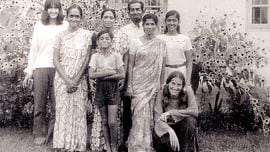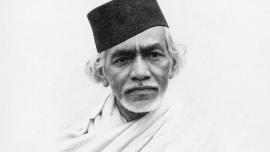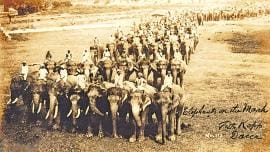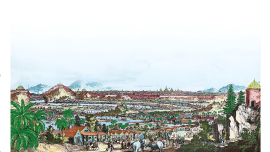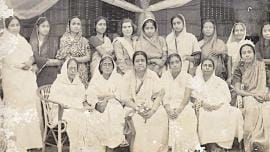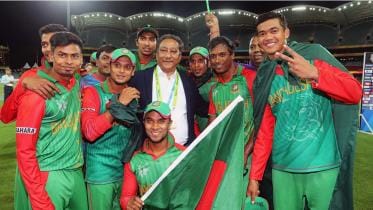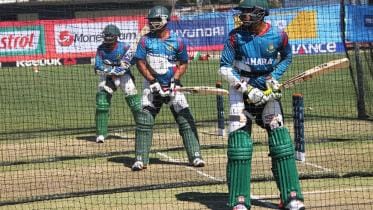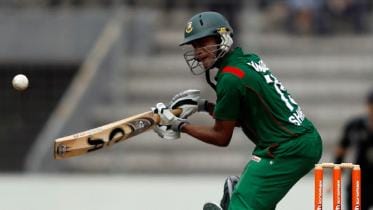In Focus / What Begum Rokeya knew about changing Bengali Muslims from within
7 December 2025, 18:00 PM
In Focus
A British witness to Bangladesh genocide: Val Harding’s 1971 story
30 November 2025, 18:00 PM
In Focus
Abul Hashim’s Bangalistaan
13 October 2025, 18:00 PM
In Focus
DHAKA, THE CITY OF ELEPHANTS / The lost history of Pilkhana’s elephant depot
5 October 2025, 18:00 PM
In Focus
156th birth anniversary of Mahatma Gandhi / Gandhi’s search for harmony in Noakhali
28 September 2025, 18:00 PM
In Focus
Sandwip’s forgotten wars
21 September 2025, 18:00 PM
In Focus
Forbidden Nazrul
31 August 2025, 18:00 PM
In Focus
Lal Salam: The making of Bangladesh’s leftist politics
25 August 2025, 18:00 PM
In Focus
Bridging the Partition through Education
17 August 2025, 18:00 PM
In Focus
Satyajit Ray’s ‘Tagore’ Films
11 August 2025, 18:00 PM
In Focus
Tigers chase fearless cricket at daunting MCG
The first time they played at the MCG, Bangladesh's fielding imploded under the pressure of the scale of the ground. Against India, they will also have to keep their nerve
18 March 2015, 03:38 AM
'No fear' Bangladesh's mantra for New Zealand test
Bangladesh coach Chandika Hathurusingha has said his team has taken confidence from the win against England at Adelaide and is ready to fight
12 March 2015, 06:18 AM
Bangladesh look for possible NZ loopholes
New Zealand dominate the leading wicket-taker positions at the World Cup. Tim Southee and Trent Boult are tied for top spot on 13 apiece
11 March 2015, 05:48 AM
Victory, a balm for the nation
The roar and the chants are unmistakable. You only hear them at a cricket stadium in Bangladesh or if you are around the Dhaka University area, soon after a big Bangladesh win. The roar was there when Bangladesh beat England in Adelaide on Monday and if you are passing by, you would be dragged towards it.
10 March 2015, 05:06 AM
Five reasons to fear Bangladesh
Don't mention 2011. Bangladesh's victory over England in the last World Cup was overshadowed by the craziness of Ireland's triumph in Bangalore
8 March 2015, 09:18 AM
Sounds of silence for edgy Bangladesh
The only sound one could hear after the crackle of the ball hitting the bat was crickets and other bugs. It was followed by a chuckle from the batsman, Mushfiqur Rahim
4 March 2015, 05:17 AM
Soumya Sarkar's shot in the dark
In dreams a woman or man you do not know may step out into view, and some quality pressing out of them is so unsettling, yet in such sharp focus, it is like they are sunset-lit.
3 March 2015, 09:38 AM
Tigers in Kangaroo’s land
One down, six to go. Bangladesh have begun brilliantly, swatting aside Afghanistan with a superbly professional and clinical performance at Canberra’s Manuka Oval in the seventh match of ICC Cricket World Cup 201
19 February 2015, 06:40 AM
Tigers go hunting
The seventh match of the ICC Cricket World Cup 2015 sees the Tigers face the non-fancy Afghans in what will be the opening hunt for our national team.
17 February 2015, 01:47 AM
Tigers train hard before Afghanistan clash
Even as Ireland were hunting down West Indies in Nelson, in a quiet corner of quiet Manuka Oval in quiet Canberra, Bangladesh were going through a three-hour intense training session. Bangladesh lost both their World Cup warm-up games, one of them to Ireland, and their first opponents in the tournament are Afghanistan, who beat them in the Asia Cup last March in the only previous ODI between the two sides.
16 February 2015, 12:42 PM
Shakib Al Hasan should lead, says Bangladesh Coach Hathurusingha
Bangladesh coach Chanidka Hathurusingha expects his ace allrounder Shakib to take a lead role in the World Cup. Shakib, who took part in the recently concluded Big Bash League, is arguably the most experienced cricketer in the side when it comes to playing in Australia.
16 February 2015, 06:31 AM
Bangladesh may play with four pacers
The bowling combination will be finalised once the Tigers inspect the pitch at the Manuka Oval, where they face the Afghans on Wednesday. Rubel Hossain is most likely to open the bowling attack with captain Mashrafe Bin Mortaza and if the team feels the match needs an extra pacer they will include young Taskin Ahmed, who has been in good touch, in the side.
16 February 2015, 06:12 AM
People pick Shakib
Bangladeshi cricketer Shakib Al Hasan once again made it into an illustrious list, after previously getting votes of confidence from Sir Vivian Richards, Muttiah Muralidaran, Andy Bichel and Stephen Fleming.
12 February 2015, 12:43 PM
'Now is the time'
Will Tamim Iqbal, who didn't field in the last game, be able to play a complete match? Will Soumya Sarkar be chosen over a specialist spinner? These and several other questions will need to be answered today; for from next week onwards, the real show begins for the Tigers.
12 February 2015, 12:36 PM
Ireland beat Tigers by 4 wickets
Ireland defeat Bangladesh by four wickets in the Tigers' third and last warm up match in Sydney.
12 February 2015, 06:48 AM
BCB organising 3 concerts to 'gain support' for Tigers in WC
BCB is organising three concerts in Khulna, Chittagong and Mirpur to spread 'positive vibes' and 'gain support' for Bangladesh team in the ICC Cricket World Cup 2015
11 February 2015, 11:07 AM


